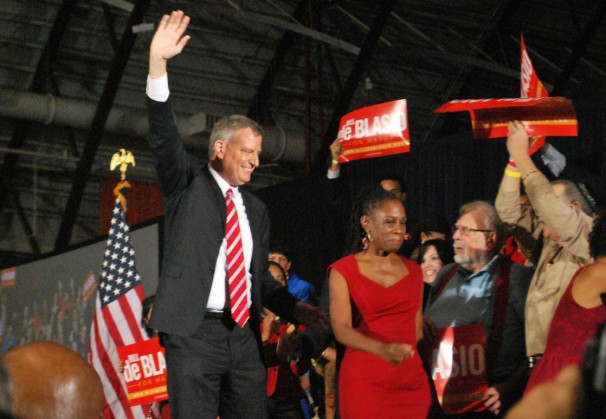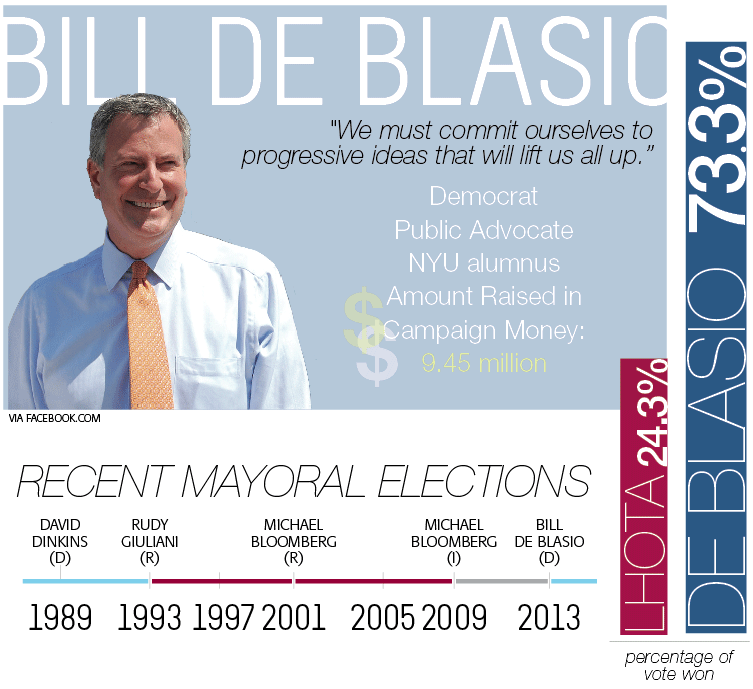Bill de Blasio wins New York City mayoral election
November 6, 2013

Public Advocate Bill de Blasio was elected the 109th mayor of New York City on Nov. 5, winning 73.7 percent of the vote with 99 percent of precincts reporting according to The New York Times.
“Progressive changes won’t happen overnight, but they will happen,” de Blasio said in his victory speech. “I will never stop fighting for the city I love, the city we all love so much, and I will never forget that as mayor, I work for you.”
De Blasio faced off against former MTA chairman and Republican candidate Joseph Lhota, who earned 24.3 percent of the vote with 99 percent of precincts reporting.
“We want our city to move forward and not backwards,” Lhota said in his concession speech. “And I hope our mayor-elect understands that before it’s too late.”

Peter Luther, 72, was a Lhota campaign volunteer and attended his election night reception.
“[Lhota]’s a gracious man who has a deep reservoir of experience in managing the city under very difficult circumstance,” Luther said. “Thanks to Bill de Blasio and thanks to the voters of New York City, we are going to run the definitive social experiment in this city as to how specific policies impact the quality of life on the street.”
Election officials said voter turnout was low, according to The New York Times. In addition, because of problems with voting machines, many voters had to complete paper ballots, which echoed problems with voting machines during the September primaries.
“It’s an embarrassment to have the nation’s largest city run elections in such a primitive and unreliable way,” politics professor Patrick Egan said. “No matter where you stand on the political spectrum, you’ve got to agree that this is something that needs to be changed.”
De Blasio will be the first Democratic mayor of New York City in 20 years.
“I think the city was ready for a change after 12 years of Bloomberg and eight years of Giuliani,” Steinhardt educational theater professor Joe Salvatore said. “I think it was finished after the primaries. I think people were pretty decided about the fact that they wanted a Democratic mayor.”
From Sept. 15 to the general election, de Blasio consistently led the polls about 40 points above Lhota.
De Blasio’s $9.45 million campaign, with advertisements including his wife and children, was a driving force in his campaign. Meanwhile, Lhota raised $3.37 million, and focused his advertisements on his past experience.
“De Blasio himself is no more charismatic than your average politician, but his family was absolutely electric,” LS sophomore John Fitzsimmons said. “He realized that his greatest asset was his family and was smart in putting them front and center in the campaign.”
Mayor Michael Bloomberg did not endorse either candidate.
De Blasio’s platform focused largely on economic inequality and supporting unions. The theme of rectifying New York City’s “a tale of two cities” was a major aspect of his campaign.
“I think we’re going to have a real opportunity here to make sure that we solve or help create change for the income inequality and other problems that we have, and help make sure that New York works for all New Yorkers,” said Josh Gold, the political director for Hotel Trades Council, a hotel workers’ union in New York City.
De Blasio also addressed many aspects of education policy, including universal pre-kindergarten, improving public schools and de-emphasizing charter schools.
“I think he has an excellent education platform, one that promises better schools for students, teachers and communities,” Steinhardt junior Victor Li said. “I also have high hopes for his stance on affording housing and homelessness. We absolutely need to bring homelessness down in the city.”
De Blasio mentioned his desire to implement changes to the controversial stop-and-frisk policy, including hiring an inspector general, reforming police leadership and creating a racial-profiling bill.
“He’s going to install a police commissioner who is going to radically curtail stop and frisk,” Egan said. “That’s something he can do quite easily as mayor and that’s one of the policies we would expect to change almost immediately as a result.”
De Blasio is an NYU alumnus, having graduated in 1983. Voters in the Washington Square Park area chose de Blasio.
The president of NYU College Republicans, John Catsimatidis Jr., said he was optimistic that students would become more involved in politics with a NYU alumnus as mayor.
“Regardless of ideology or political party, [an NYU alumnus is] definitely nice to see and it’s definitely inspiring,” Catsimatidis Jr. said. “Hopefully it’ll generate a lot more curiosity within politics and our country in general.”
College Democrats of NYU secretary and Gallatin sophomore Chloe Chik said she was unsurprised by de Blasio’s continuous lead in the polls.
“It’s a good way to see that at NYU our [alumni] are really active are really getting the name out,” Chik said. “I think that what’s going to be a point of contention though is that although he’s an NYU [alumnus], as public advocate, he was against the zoning issues for NYU 2031.”
NYU politics professor Lawrence Mead said de Blasio’s victory tonight could lead to higher crime rates, more powerful unions and problems with the budget.
“[The administration will] relax the social standards in all three gears, which is crime, welfare and schools,” Mead said. “In all those areas, we will see … a return to greater disorder.”
De Blasio will be inaugurated in January 2014.
In the other citywide elections, Scott Stringer, the Democratic candidate and the current Manhattan borough president, won the race for city comptroller. Letitia “Tish” James, the Democratic candidate and former councilwoman, won the race for public advocate.
A version of this article appeared in the Wednesday, Nov. 6 print edition. Email the WSN News staff at [email protected].
*An earlier version of this article incorrectly stated that Chloe Chik was the NYU College Democrats president when she is the NYU College Democrats secretary. WSN regrets the error.























































































































































